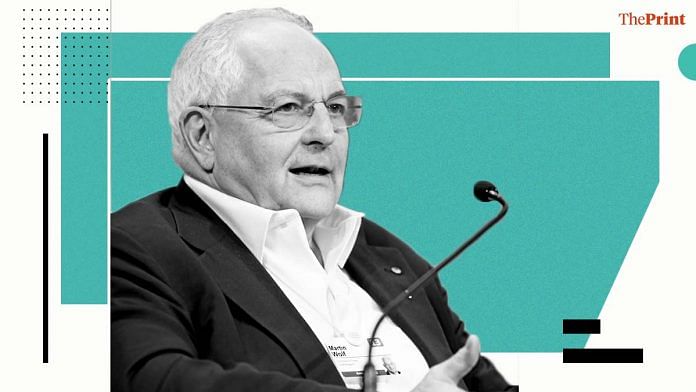
New Delhi: India will have to be “engaged in balancing China”, said Martin Wolf, associate editor and chief economics commentator at The Financial Times, as he advised the Indian government to “remain open” economically.
Wolf was in conversation with ThePrint’s Editor-in-Chief Shekhar Gupta Friday at the Public Affair Forum of India’s (PAFI) seventh National Forum 2020.
Responding to a question on what his “prescription” was to revive the Indian economy, Wolf said that some “legacy problems” have to be first fixed.
“In economics, you have to fix the legacy problems, like debt problems. There also needs to be a reconstruction of the financial system, reconstruction of the private sector balance sheet,” he said.
The economy expert also said that reforms in labour markets were important for long term growth and emphasised on the importance of an “investment programme”. “You are going to need to work out a very serious investment programme, which will involve private public partnerships but investment is going to have an important source of growth.”
He added, “Trade policy is important too…tendency towards self-sufficiency is going to prove crippling. On the contrary, you should be leading trade liberalisation. It’s your future.”
Wolf highlighted a crucial issue in which India lacked focus — spending on education and healthcare. If one was to compare India and China, he said, the biggest difference would be the latter’s relative success in educating its entire population to a higher level.
‘India’s politics, security policy & economic needs are going to clash’
Wolf acknowledged that India’s economic growth was slowing even before the coronavirus outbreak began. He explained that India has had a long history of “inward looking developments” but they hadn’t worked well.
“After the Covid shock, a tremendous acceleration was needed but it was difficult given the debt overhang, weakness of the banking sector, underlying slowdown in growth which weakens investment demand,” he said.
Wolf then added that India will have to “engaged in balancing China” and advised the Indian government to “remain open” economically.
The economics commentator predicted that China will be the fastest growing market in the next 10 years. Not engaging with China over strategic breakdowns, he said, would prove “costly” for India.
“The ideal will be to conduct your politics to some degree separate from your economics but that’s difficult…You’re in some big strategic dilemmas in which your politics and security policy and economic needs are going to clash,” he said.
US elections
When asked about the influence of a Joe Biden presidency in the US, Wolf said that an administration led by the Democratic leader will be centrist. “There will be pressure from the Left, the tone of his administration will be very similar to the Obama (former president Barack Obama) administration.”
But he also said that a Biden administration will be “more hostile” toward China. Wolf predicted that Biden’s trade policy won’t roll back all the tariffs imposed on China. “He will use them in a multilateral way,” said Wolf.
“The approach will be more like that of the Americans in the Cold War running an alliance system than America all on its own,” he explained.
Subscribe to our channels on YouTube & Telegram
Why news media is in crisis & How you can fix it
India needs free, fair, non-hyphenated and questioning journalism even more as it faces multiple crises.
But the news media is in a crisis of its own. There have been brutal layoffs and pay-cuts. The best of journalism is shrinking, yielding to crude prime-time spectacle.
ThePrint has the finest young reporters, columnists and editors working for it. Sustaining journalism of this quality needs smart and thinking people like you to pay for it. Whether you live in India or overseas, you can do it here.